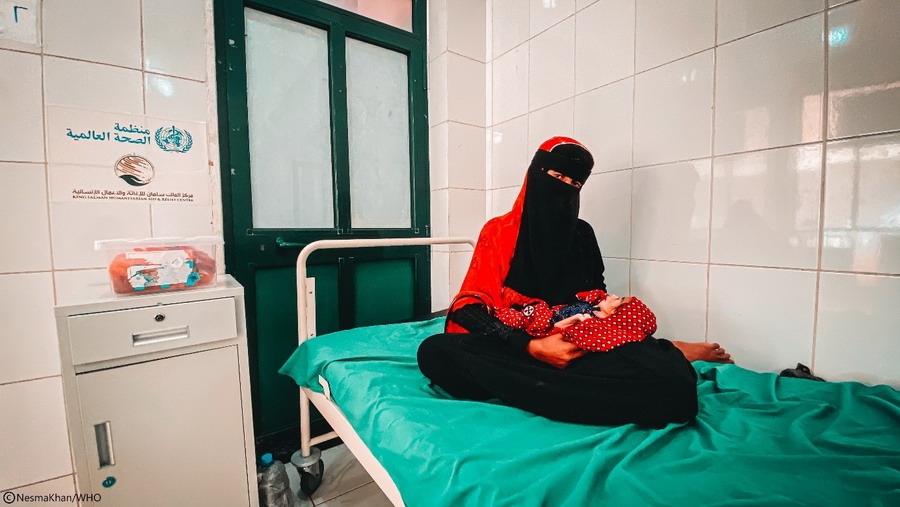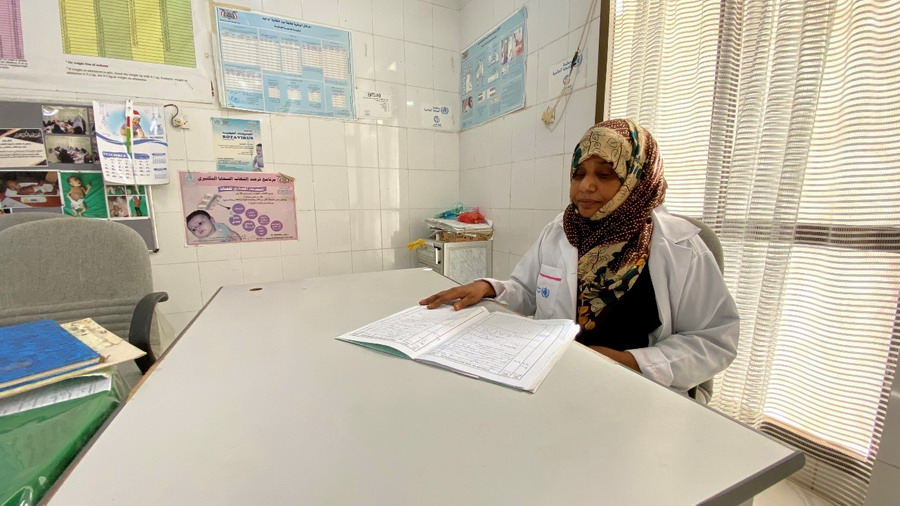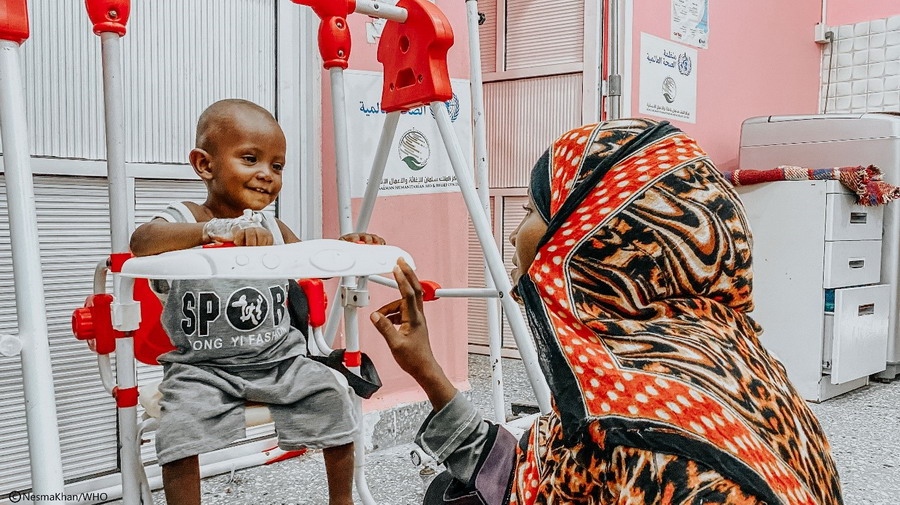 Mrs Yassmin with her malnourished daughter Arhaf at Al-Sadaqah Hospital in Aden. The hospital is supported by WHO and KSrelief. Photo: WHO/Nesma Khan
Mrs Yassmin with her malnourished daughter Arhaf at Al-Sadaqah Hospital in Aden. The hospital is supported by WHO and KSrelief. Photo: WHO/Nesma Khan30 March 2021 – Arahaf was only aged 40 days and weighed 1.650 kg when her family, displaced from Taiz due to the ongoing fighting, brought her to Al Sadaqa Hospital in Aden.
"As we couldn't feed her properly, we were advised to bring her here not to lose her," said Arahaf's mother, Yasmin.
Arahaf received specialized treatment in the hospital's therapeutic feeding centre supported by the World Health Organization and the King Salman Humanitarian Aid and Relief Centre (KSrelief).
"Arahaf has been getting better thanks to the free treatment and formula milk she's been receiving," said Yasmin.
Al Sadaqa therapeutic feeding centre is one of the 90 supported by WHO and KSrelief across Yemen, through a joint project to fight child malnutrition by sustaining essential nutrition services and enhancing access to life-saving interventions, including for the most vulnerable populations. Funded at US$ 5.5 million, the partnership was signed in September 2020 as part of a broader US$ 46 million agreement between the 2 organizations. It aims to treat 23 428 under 5 severely malnourished children with medical complications free of charge.
Al Sadaqa Hospital receives increasing malnourished children from Aden and the neighbouring governorates.
 “Thanks to the support of WHO and KSrelief, we've been able to provided severely malnourished children with the much-needed, often life-saving emergency nutrition support” says Nasra Mohammed, Head of the Department of Malnutrition in Al-Saddaqa Hospital in Aden. Photo: WHO
“Thanks to the support of WHO and KSrelief, we've been able to provided severely malnourished children with the much-needed, often life-saving emergency nutrition support” says Nasra Mohammed, Head of the Department of Malnutrition in Al-Saddaqa Hospital in Aden. Photo: WHO
"Every day, we receive around 4 new cases of child malnutrition in our department. Recently, 35 cases from other governorates like Al-Hudaydah, Lahj and Taizz were also admitted in our therapeutic feeding centre," said Nasra Mohammed, Head of the Al-Sadaqa Hospital Malnutrition Department.
"We are working hard to help them, but the nutritional situation in Yemen has worsened. However, thanks to the support of WHO and KSrelief, we've been able to work around the clock the provide children with the much-needed, often life-saving emergency nutrition support," she added.
Acute malnutrition among young children and mothers in Yemen has increased with each year of conflict with a significant deterioration during 2020 driven by high disease rates, such as diarrhoea, respiratory tract infections and cholera, and rising food insecurity rates.
According to the latest Integrated Food Security Phase Classification (IPC) Acute Malnutrition report released in February 2021, nearly 2.3 million children under 5 in Yemen are projected to suffer from acute malnutrition this year. Of whom 400 000 are expected to suffer from severe acute malnutrition and could potentially die if they do not receive urgent treatment. At the same time, around 1.2 million pregnant or breastfeeding women in Yemen are projected to be acutely malnourished in 2021.
Among the worst-hit governorates are Aden, Al Dhale, Hajjah, Al-Hudaydah, Lahj, Taizz and Sana'a City, which account for over half of expected acute malnutrition cases in 2021.
"Most of the mothers in the region are uneducated and don't know that kids need only breastfeeding during their first 6 months. In addition to providing children with life-saving treatment, we are working at the community level to raise the mothers' awareness of the importance of breastfeeding," said WHO Nutrition team lead in Yemen Dr Ferima Coulibaly-Zerbo.
Abdullah, a 2-year-old with severe acute malnutrition from Aden governorate, has been admitted to Al-Buriqa Health Complex in Aden to receive emergency nutrition care.
"My husband is a porter, and we cannot afford to buy food and medicines for our son," said Wedian, Abdullah's mother.
 Baby Abdullah, 2 years old, plays with his mother at Buriqa health complex’s therapeutic feeding center supported by WHO and KSrelief. Photo: WHO/Nesma Khan
Baby Abdullah, 2 years old, plays with his mother at Buriqa health complex’s therapeutic feeding center supported by WHO and KSrelief. Photo: WHO/Nesma Khan
"Thanks to the care he's been receiving here, Abdullah's health has greatly improved," she added.
Thanks to the support of KSrelief, WHO will be able to distribute admission kits and water sanitation and hygiene (WASH) kits, to support the care of children admitted at the therapeutic feeding centres. Their caregivers will also receive nutrition counselling, making the total number of direct beneficiaries of the project 46 857 people.
The project targets all governorates classified at levels 3 (crisis) and 4 (emergency) according to the 2019 Integrated Food Security Phase Classification. Priority will be given to 226 districts identified at high risk by the Nutrition Cluster because of their high food insecurity levels, high population density, and vulnerable internally displaced and refugee populations.
The project will also rehabilitate or equip 45 out of the 90 therapeutic feeding centres while establishing 13 new centres to enhance access to treatment and health services in districts where acute malnutrition is a public health concern. A total of 1400 health workers will be skilled to ensure high-quality services.
"The generous contribution from KSrelief will help WHO bolster its malnutrition response. The timely support is particularly welcome as Yemen faces unprecedented rates of child malnutrition," said Dr Adham Ismail, WHO Representative in Yemen.
The long-lasting support aims to benefit over 4.5 million children under 5 in the upcoming years, including children living in areas surrounding the targeted therapeutic feeding centres.




